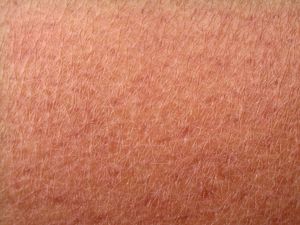Vitamin E Oil For Skin - The Right Kind of Vitamin E Makes All the Difference in Skin Care
| Share on Facebook | Share on Twitter | Share on Google+ |
One of the main reasons people take vitamin E supplements and use vitamin E lotions is for skin care. Using the right kind of vitamin E, however, makes all the difference in how well these products work.

First of all, it's important to understand that it is never a good idea to open vitamin E capsules on skin itself. The kind of vitamin E that is best absorbed inside your body, vitamin E succinate, is not the form of vitamin E that is best absorbed through your skin. Your skin responds better to vitamin E acetate.
And even if you got capsules of vitamin E acetate (they aren't very expensive) and broke them open to apply the oil to your skin, the vitamin E would not stay on your skin or penetrate your skin. Skin lotions are specially formulated to bind to the ceramides in your skin so the active ingredients have a chance to work. The oil inside vitamin capsules in not.
It turns out that "vitamin E oil" is not a great idea for your skin, either. If it's an oily liquid, it's not going to stay on your skin very long. The best vitamin E products for skin care are made with cholesterol (that's right, cholesterol) and other denser natural fats to stick to your skin. And most of the time products that are labeled as vitamin E oil are the forms of vitamin E that do not have the full antioxidant potency your skin needs.
Why vitamin E acetate is the best form of synthetic vitamin E on your skin. Vitamin E acetate (also known as d-tocopheryl acetate or dl-tocopheryl acetate) has many shortcomings as a nutritional supplement taken by mouth. It requires a lot of digestive enzymes to be broken down into a form that can cross into the bloodstream. Even when it is absorbed, the free radical fighting part of the vitamin is chemically bound to the acetate. On the skin, however, this is a good thing.
The antioxidants in this form of vitamin E counteract the free radicals released by sunlight. Solar damage to the skin is caused by both UV-A and UV-B rays. If you apply a cream containing vitamin E to your skin, the vitamin E acts as a natural sunblock, capturing the UV-B rays before they can harm your skin.
Vitamin E does not block UV-A rays, and these rays can trigger inflammatory reactions by the immune system in your skin. Vitamin E, however, modifies that inflammatory reaction so that less damage is done to your skin by the sun.
The same qualities that make vitamin E acetate a poor choice as a supplement make it a great choice for skin protection. But there is an even better vitamin E treatment for your skin. That's natural vitamin E, the -ol form, not the -ate form, applied directly to your skin.
Why natural vitamin E is even better than synthetic vitamin E for your skin. Even better than any acetate, succinate, nicotinate, or linoleate form of vitamin E is natural d-alpha-tocopherol (not dl-alpha-tocopherol or any form of vitamin E identified as a "tocopheryl"). The free radicals in natural vitamin E are much more active on your skin. Tocopherol is always better than tocopheryl, but tocopheryl is what almost all skin care products contain.
And even when you do find a vitamin E oil that is made with tocopherols, the antioxidants in the product are likely lost before you put the product on your skin. Tocopherols are not just active on your skin. The problem is, they are also much more active in the bottle. You have to keep your skin care products tightly sealed to avoid losing all the antioxidant potency of vitamin E in the product to the oxygen of the atmosphere. And natural vitamin E is very expensive.
That's why most brands of "pure and natural" vitamin E oil are neither. They are simply synthetic dl-alpha-tocopheryl acetate in a clear fluid that looks like oil. Look for products in which vitamin E is not the main ingredient for your best acne skin care and scar treatment options.
-
Skin CareMen Skin Care
-
Free ResourcesFree eBooks
-
Every human being is the author of his own health or disease.Buddha
-
Featured Health SupplementTotal Balance
 provides a broad spectrum of around 80 of the nutrients that your body needs…including vitamins, minerals, trace elements, antioxidants, amino acids, neuronutrients, bioflavonoids, carotenoids, herbal extracts, enzymes and other complementary co-factor ingredients.
provides a broad spectrum of around 80 of the nutrients that your body needs…including vitamins, minerals, trace elements, antioxidants, amino acids, neuronutrients, bioflavonoids, carotenoids, herbal extracts, enzymes and other complementary co-factor ingredients.
-



















